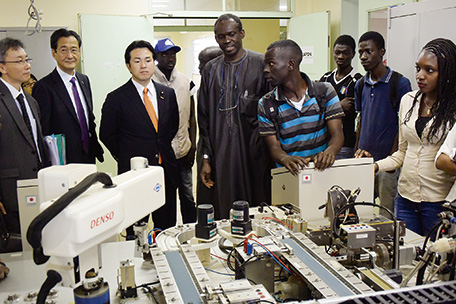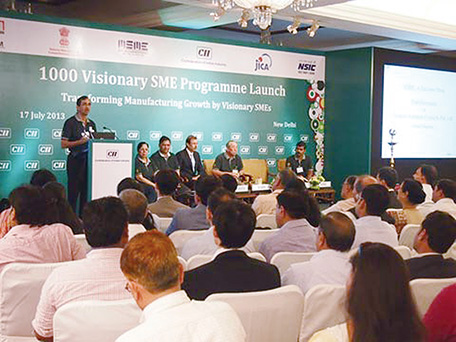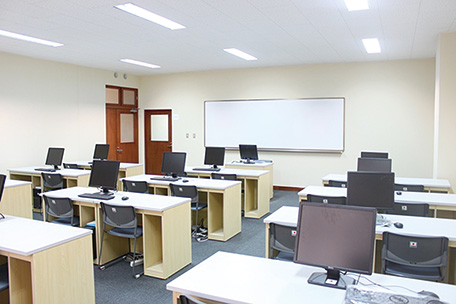(2) Vocational Training and Industrial Human Resources Development, and Employment Creation
To achieve quality growth in countries and thereby solve the poverty and other problems that these countries face, it is essential for their populations to acquire the necessary vocational skills. In developing countries, however, opportunities to receive quality education and training are limited. Moreover, ineffective use of human resources is stifling opportunities for earning sufficient incomes. A shortage of appropriate human resources thus poses a major obstacle also to industrial promotion and industry development.
Especially in countries and regions affected by conflict, improving the livelihood of the socially vulnerable, including persons with disabilities, women, and demobilized soldiers, is a critical issue for the reconstruction phase. In this regard, vocational training as a component of the social safety net (a system in which the entire society secures the lives of each and every person) plays a pivotal role.
“Work” constitutes a fundamental activity of mankind that shapes society. Increasing income by finding a job is an important means for elevating the standard of living of poor people. Nevertheless, a severe employment situation persists, with the number of unemployed in the world reaching approximately 200 million people in 2013. To create stable employment under these circumstances that will lead to poverty reduction, it is an urgent task to prepare for risks by developing social safety nets, as well as to engage in an international effort across countries to realize “decent work.”
Against this backdrop, the 2030 Agenda for Sustainable Development, which succeeds the MDGs, was adopted at the 70th Session of the UN General Assembly in September 2015. Among the SDGs in the Agenda, Goal 8 was established as follows: “Promote sustained, inclusive and sustainable economic growth, full and productive employment and decent work for all.”
< Japan’s Efforts >
| Vocational Training and Industrial Human Resources Development

Then Parliamentary Vice-Minister for Foreign Affairs Takashi Uto (front) visits the Vocational and Technical Training Center (CFPT) Senegal-Japan established with cooperation from Japan in March 2015.
Based on requests from developing countries to develop human resources who can respond to diverse needs in technology and skills, Japan provides support to leading polytechnic and public vocational training schools which will serve as core centers in each country. In implementing this assistance, Japan, in cooperation with the private sector, supports the capacity building of teachers and trainers, the reinforcement of the operational capacity of training schools, and curriculum improvement, in order to further strengthen the linkages between education and employment. Through 12 projects in eight countries, Japan has contributed to the skills development of persons including women, persons with disabilities, and demobilized soldiers, as well as refugees and persons affected by conflict.
In the area of industrial human resources development, Japan, in collaboration with the industry sector, implemented 50 comprehensive cooperation projects in 27 countries between 2000 and 2015. The projects drew on Japan’s insight and know-how for the development and revision of curriculums and teaching materials, along with the capacity enhancement of trainers. Additionally, Japan supported Technical and Vocational Education and Training (TVET) institutions by improving facilities and equipment at 11 schools in six countries.
Japan also implements projects for promoting women’s economic empowerment. In Nigeria, Women Development Centres (WDCs) were established throughout the country for providing literacy education and vocational training to women mainly in rural areas. However, many of the WDCs were unable to provide adequate services. At the request of the Government of Nigeria, Japan provided assistance to develop an operating model for the WDCs in Kano State in northern Nigeria. Based on the impacts delivered, Japan is now providing assistance to roll out these outcomes at the national level and ensuring its continuity.
As for the Ministry of Health, Labour and Welfare (MHLW), it conducts trainings in Japan and primarily Southeast Asian countries(Note 3) with which Japan has expanding and deepening economically interdependent relationships. The trainings are designed to transfer the government’s and the private sector’s accumulated know-how regarding Japan’s skills evaluation system (Japan’s National Trade Skills Test),(Note 4) with a view to developing and securing a quality workforce. In FY2014, a total of 156 people from the seven countries received these trainings, bringing the cumulative total to approximately 1,900 people including trainings conducted in FY2013 and earlier. The trainings are expected to develop and improve skills evaluation systems in these countries, which in turn will promote the development of their skilled workers and elevate their social standing through increased employment opportunities.
In addition, through Japan’s contributions ($96,000) to the International Labour Organization (ILO), the ILO’s Skills and Employability Programme in Asia and the Pacific (SKILLS-AP) conducted surveys, studies, seminars, and trainings on vocational training policies, vocational training methods, and vocational training information networks, which were attended by members of governments, employers, and worker organizations in the regional countries.
At the Japan-ASEAN Summit in November 2015, Japan unveiled the Industrial Human Resource Development Cooperation Initiative, aimed at encouraging the development of industrial human resources who contribute to Asia’s sustainable growth. Under this initiative, Japan will support the development of industrial human resources in Asia through “All-Japan” collaboration, by grasping human resources development needs through dialogues with each country and strengthening industry-academia-public partnerships.
| Employment Resources Development
Japan considers job creation to be one approach for reducing poverty, and one of the priorities of Japan’s development cooperation. Based on this concept, Japan extends assistance to increase job seekers’ abilities to make a living through vocational training. Japan also provides assistance that expands social protection, such as support for creating social insurance systems and support for realizing occupational safety and health, with a view to achieving “decent work.”
In addition, Japan provides voluntary funding to the ILO to implement a job creation project(Note 5) that benefits people affected by the typhoon disaster in the Philippines, as well as to conduct humanitarian assistance in conflict regions in Africa. Japan is actively engaged in activities through international organizations and plays a significant role in resolving labour issues throughout the world.
For example, in Baidoa and Kismayo (Somalia), Japan conducts vocational training and creates jobs for internally displaced persons (IDPs) and refugees who have repatriated from neighboring countries to facilitate their settlement. More specifically, Japan creates employment by implementing programs for IDPs and repatriated refugees to repair roads, markets, and other infrastructure.
- Note 3: Indonesia, Thailand, Viet Nam, Myanmar, India, Cambodia, and Laos.
- Note 4: The trainings consist of two types: (i) “Training for people in charge of creating the test standards and test questions”; and (ii) “Training for people in charge of test implementation and marking.” The number of participants indicated above is the total of these trainings combined.
- Note 5: The Japanese government’s contributions to the ILO will be used to implement the “Integrated Livelihood Recovery for Typhoon Haiyan Affected Communities” project, which will support approximately 20,000 workers including people affected by the typhoon. This project will help rehabilitate public infrastructure, develop vocational skills for offering means of alternative livelihoods, and re-establish micro enterprises and SMEs.
India
Project on Champions for Societal Manufacturing
Technical Cooperation Project (April 2013 – Ongoing)

Project participants present successful examples of application of the program at their companies at a seminar. (Photo: JICA)
In recent years, India’s economy has grown at a rapid pace. While this growth is driven by ICT and the services industry, development in the manufacturing industry has lagged relatively behind. The manufacturing industry accounts for only around 16% of India’s GDP, indicating that its growth potential is not being capitalized upon. The problem is that there are too few business leaders to adequately develop the manufacturing industry. This is because only a low percentage of India’s engineering and business administration graduates go on to work in the manufacturing industry.
The development of business leaders in the manufacturing industry is not only important for improving the efficiency of the industry itself, but also for contributing to societal demands for reduced environmental pollution and business expansion with the poor in mind. It is therefore extremely important for the sustainable development of India’s manufacturing industry. To address this national issue, the Government of Japan is cooperating with the Government of India to assist the development of industrial human resources and in particular the training of business leaders in the manufacturing industry. The Visionary Leaders for Manufacturing Project was implemented with Japanese support from 2007 to 2013 and successfully developed close to 900 business leaders, who learned Japanese-style manufacturing principles and management approaches.
The Government of India highly appraised this project and presented the Padma Shri Award to Mr. Shoji Shiba, Professor Emeritus at the University of Tsukuba, who had provided instruction as a JICA expert, in 2012. This award is one of India’s highest civilian honors and it recognizes people who have contributed greatly to India in various fields. Using the framework of the Visionary Leaders for Manufacturing Project, the Project on Champions for Societal Manufacturing was launched in 2013. This project promotes the development of human resources with the assistance of the almost 900 program graduates.
As part of this project, experts are dispatched from Japan to provide expertise, knowledge and skills for production process improvements across the value chain. This includes training across a wide range of themes related to the challenges faced by India’s manufacturing industry as well, such as environmental consideration and inclusive growth. Participants also undergo training in Japan and observe Japanese manufacturing practices in the field. In addition, participants conduct research and presentations about Japanese society and culture.
This project is expected to help enhance India’s manufacturing base through Japanese style management approaches. (As of August 2015)
Democratic Republic of the Congo
Projet d’Aménagement de la Direction Provinciale de Kinshasa de l’Institut National de Préparation Professionnelle
Grant Aid Project (June 2012 – October 2014)
Located in Central Africa, the Democratic Republic of the Congo has a high unemployment rate, especially among youth. The high unemployment rate in urban areas, where population growth is also high, has led to deteriorating public safety.
The eastern part of the country also faces serious challenges such as improving the livelihood of a vast number of internally displaced persons who have emerged as a result of conflicts in the region and helping ex-combatants reintegrate into society through vocational training.

A computer practice lab is one of the facilities established through this cooperation. (Photo: JICA)
It is important for the stability of Congolese society to create an environment where these people can work with peace of mind, to enhance their skills, and to help them participate in social and economic activities.
As such, there was an urgent need to strengthen the functions of vocational training facilities. However, the National Vocational Preparedness Institutes and most other vocational training facilities had aging infrastructure or had reached their capacity limits, while equipment had also deteriorated and was lacking. Those circumstances made it impossible to provide sufficient vocational training.
As a result, Japan worked on expanding and improving the main facilities at the National Vocational Preparedness Institute of Kinshasa, the capital of the Democratic Republic of the Congo, as well as upgrading its vocational training equipment.
The facility improvements included the construction of a three-story training building, which housed not only classrooms, but also freezer/air conditioning, electrics, and electronics training rooms, computer labs, an information zone, multipurpose rooms, a library, and study rooms, as well as the construction of an administration building and an annex building. The Government of Japan provided equipment specific to the mechanical, automotive, electrics, electronics, welding/plating, architecture, civil engineering, woodworking fields, as well as equipment common to all fields.
Japan’s assistance helped to replace the aging and cramped training environment of the National Vocational Preparedness Institute of Kinshasa, and through the provision of the new equipment, vocational trainees now have an opportunity to access the latest technologies.
Social stability through the development of vocational human resources is urgently needed in the Democratic Republic of the Congo, and Japan has greatly contributed to this goal by improving the quality of vocational training.
